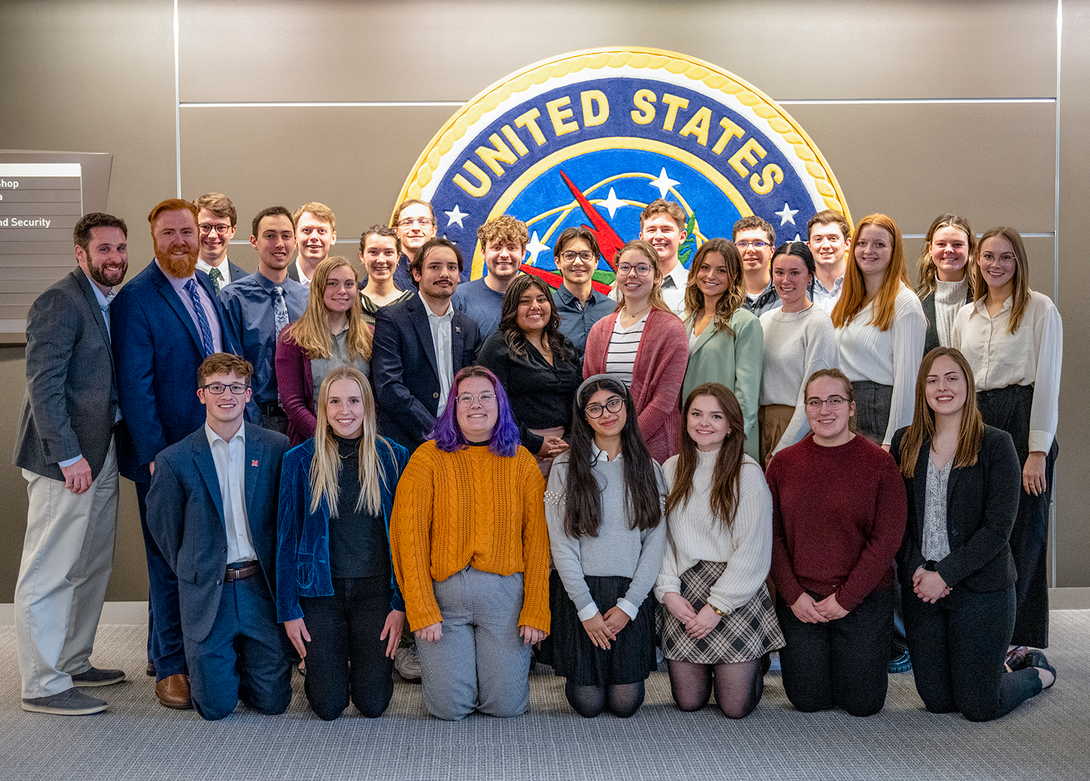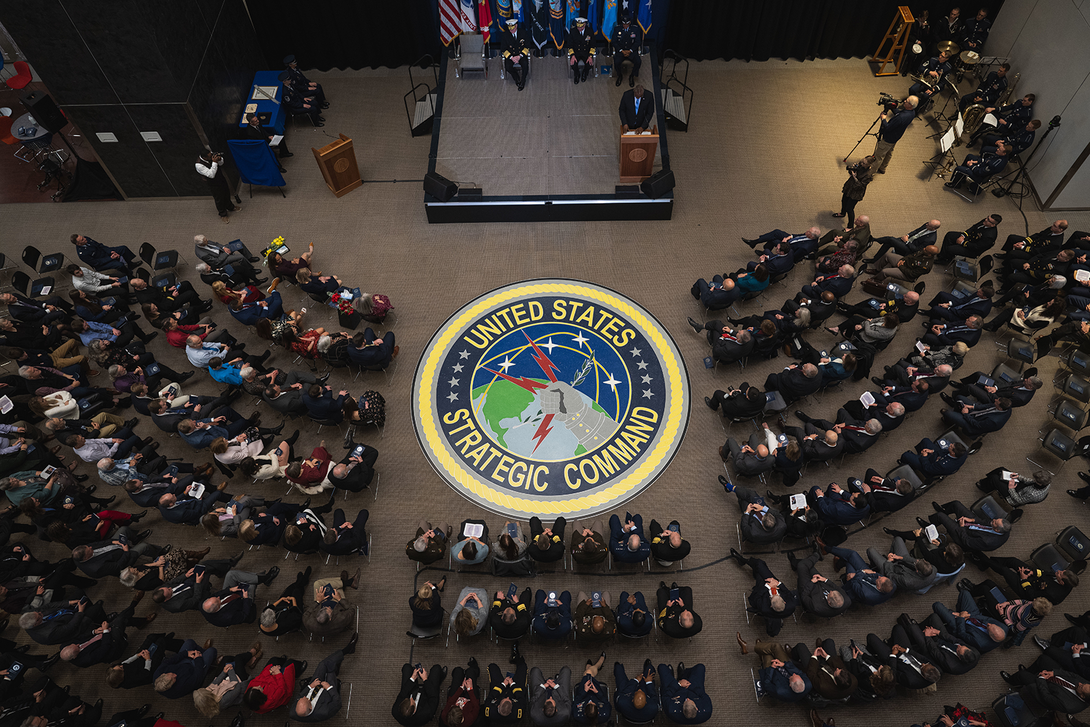
A semester of nuclear deterrence research landed 26 University of Nebraska–Lincoln honors students in front of a panel of U.S. Strategic Command officials.
The student-led presentation was the latest in a years-long partnership between U.S. Strategic Command’s Deterrence and Assurance Academic Alliance and the national security studies program at Nebraska. On Dec. 8, the students traveled to StratCom headquarters on Offutt Air Force Base in Bellevue, where they discussed their findings on research questions formulated by the Academic Alliance team and finalized by the StratCom commander.
The four student groups covered topics ranging from the Russia-Ukraine crisis to Finland and Sweden’s accession to NATO.
“This is an excellent example of our students engaging with an outside stakeholder — and, doing so with leaders of the U.S. military’s most important mission set, which just happens to be 40 miles up the road from campus,” said Tyler White, associate professor of practice and director of the national security studies program. “We’ve had a number of students go through this process and decide to change their career path to national security.
“My biggest hope is that beyond the enrichment for the students, we’re creating a new cadre of young professionals who want to go in and take up that mission and want to be the next generation of providers of deterrence, so that we never have to face the that worst day.”
The students were part of two of White’s honor’s courses: “You MAD Bro? Mutually Assured Destruction, Deterrence and Assurance: The Politics of Nuclear Weapons” and “Global Changemakers.”
“I began incorporating these research questions into my courses because I thought it was a cool idea to have outsiders, a neat mix of different majors, give their perspectives on some of these ideas,” White said.
During the visit, students got an inside look at the command and its history. They were one of the first student groups to visit since 2019 and were among the first to see the new U.S. Strategic Command headquarters building, also called the command and control facility or C2F.
“For students to be able to come into the building and see the roughly 3,000-plus people that are supporting the command’s mission to protect our country and interact with the national security professionals that are there is really valuable,” said Dave Rattner, Academic Alliance coordinator.
The students prepared 15-minute presentations that covered their research methodology, terminology, analyses and conclusions. They presented in front of Kayse Jansen, chief of the Deterrence and Analysis Branch; and Jamica LaSonde, chief of the Deterrence Analysis and Research Division.
“They were thoroughly impressed with the UNL students’ presentations,” Rattner said. “Their presentation skills were on par with those of our professionals in the way they tackled the concepts. The ability to go up there and speak precisely, concisely and professionally under a time constraint is a skill that I think is applicable to almost every job that an individual may go into.”
The reviewers were so impressed that they expressed interest in continuing the conversation of potential careers in national security with the students.
“We’re excited to invite some of them back,” Rattner said. “We’re hoping that some of the work they’ve done has inspired them to look into jobs in national security. We always try to continue that conversation. Many students who have participated in this and other events get recruited by various entities.”
The students have various backgrounds and majors like economics, accounting, political science and marketing. And, together they eloquently tackled the challenge of learning about unfamiliar topics such as nuclear weapon policies and deterrence strategies.
“It was a surreal experience, and I’m especially proud of my peers,” said Ethan Czapla, a junior from Lincoln. “Our class has a wide range of majors and research interests, so presenting original research on an unfamiliar subject was already challenging. To then present the research to professionals in the field was pretty extraordinary, and my peers did an excellent job.”

Many students were interested in law or national security, including Czapla, who is studying political science and history with a minor in national security studies. Czapla is seeking a career as an analyst in a national intelligence agency or a career in foreign service.
“It was a captivating experience not only to present but meet the individuals who lead our nation’s global deterrence mission,” he said. “This experience will certainly help me in the future.”
“Partnering with the Honors Program, through learning experiences such as this course, provides some of the brightest students in Nebraska with a glimpse into the national security mission.”
White assigned students the questions in class, and then the students prepared papers and briefings on the topics. White invited members of the command down to Lincoln to hear the briefings, and in return, the students have been invited to the command a handful of times.
“My experience with Tyler White and his honors class has been phenomenal,” Rattner said. “They show a great foundation and have picked up these really difficult concepts within a semester at Lincoln. The UNL presentations are always extremely well received from the command and people that are able to interact with the students always have positive things to say. When we start talking about designing deterrence education, White is one of the people that we lean on and ask about those concepts.”
In addition to the students receiving in-depth knowledge about complicated deterrence concepts through these courses, White believes presenting in front of the command officials is an experience that will set these students apart from others in the future.
“I feel like that’s a resume line that coming up after graduation can really separate people,” he said. “I’ve had folks in the J5 call me and ask about students and every single one of those students I’ve referenced have all gotten internships and now they all have jobs.”
White, who was selected to be the host for the last Academic Alliance conference, facilitates the relationship with the Academic Alliance. The University of Nebraska–Lincoln’s participation in the Academic Alliance, which partners with 70 institutions, contributes to a larger partnership between StratCom and the University of Nebraska System, which includes the National Strategic Research Institute.
The goal of the Academic Alliance is to develop an academic community of interest focused on research and analysis of deterrence, assurance and associated strategic-level national security themes in a rapidly changing, multi-domain global threat environment.

“We’re always looking for diversity of thought, diversity of background and diversity of opinion,” Rattner said. “Bringing in a new, fresh perspective is incredibly important as we adjust to a new multipolar world. We’re looking to the next generation as well as the current generation to come up with strategies of how we’re going to address these issues.”
The Academic Alliance partners with its member institutions to educate students and hosts a variety of events and activities to facilitate pursuit of the command’s goals and the students’ career goals.
Ultimately, the partnership is a mutually beneficial relationship that uses opportunities like this to inspire and create career opportunities for students, while supporting the greater good.
“U.S. Strategic Command has this giant burden, and it’s really important, but nobody really knows what it does or how it operates,” White said. “It’s a huge, missed opportunity if we’re not jumping on this to try to provide the best Nebraska students to at least try to get them interested in and maybe even working up there.”







